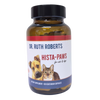Every pet parent wants their dog or cat to feel calm, happy, and healthy, but sometimes anxiety, tummy troubles, or sudden behavior changes seem to come out of nowhere. The truth is, your pet’s digestion and emotions are more closely connected than you might think. This link, known as the gut-brain axis, explains how what’s happening in the gut can directly influence mood, stress levels, and even behavior.
The good news? Nutrition plays a powerful role in supporting both. In this blog, we’ll explore how the gut-brain axis works in pets and simple diet strategies you can use to nurture a healthier tummy and a calmer mind.
What Exactly Is The Gut-Brain Axis in Dogs and Cats?
The gut-brain axis is a two-way communication system that links your dog’s and cat’s digestive tract to their brain. This system involves the nervous system, immune system, and endocrine (hormonal) system. In fact, the gut is often called the “second brain” because it has its own independent nervous system, the enteric nervous system, which can produce neurotransmitters like serotonin, dopamine, and GABA.
In humans, studies show up to 90% of serotonin is produced in the gut. While exact numbers in pets may vary, research confirms the same gut-brain connection exists in dogs and cats. The serotonin, the ‘feel-good’ chemical linked to mood, appetite, and sleep, is produced in the gut. While most of it acts locally in the digestive system, the gut microbiome can influence serotonin pathways that affect brain function and emotional well-being.
This means that when your pet's gut is balanced, it sends calming, steady signals to the brain. But when the gut is out of balance, those signals can become ‘skewed,’ contributing to anxiety, restlessness, or changes in behavior. In other words, your pet’s gut and brain are in constant conversation. Let’s break it down with a case study so you can better understand how this connection works and what it means for your pet’s health.
How Does the Microbiome Affect a Pet's Mood and Behavior?
Imagine your dog, Bella. Normally she’s playful, eats well, and loves walks. But lately, she’s had bouts of diarrhea, itchy skin, and seems more anxious than usual.
What’s happening inside Bella’s body? Her gut is home to trillions of tiny helpers—bacteria, fungi, and other microorganisms—called the microbiome. When balanced, this ecosystem keeps digestion smooth, helps her absorb nutrients, supports her immune system, and even regulates her mood.
But when the microbiome gets out of balance (a condition called dysbiosis), the effects ripple through the whole body. Studies in humans and pets show that microbiome imbalances can lead to:
-
Chronic digestive issues (diarrhea or constipation)
-
Food sensitivities and skin allergies
-
Increased stress and anxiety
-
Mood changes, restlessness, or even aggression
That’s because the bacteria in the gut help make “feel-good” brain chemicals like serotonin and keep the immune system calm. So when the gut is upset, the brain feels it too.
Want to help your pet restore balance naturally? Check out our Digestive Support Protocol for step-by-step gut healing, and explore our Gut Health Course to learn how to protect your dog or cat’s digestion and mood long-term.
How Does Stress Affect Your Pet's Gut Health?
Now imagine Bella during a thunderstorm. She’s panting, pacing, and hiding. That stress triggers a surge of cortisol (the stress hormone), which makes her gut more “leaky” and inflamed.
This sets off a vicious cycle:
Stress → disrupts gut bacteria → causes inflammation → sends anxious signals back to the brain
Poor gut health → reduces calming brain chemicals → makes Bella even more stressed
Over time, stress and poor gut health feed into each other, making anxiety and tummy troubles worse.
| The takeaway: Your pet’s mood and behavior aren’t “just in their head.” Their gut health plays a powerful role, and stress can make gut issues worse. To truly help your pet, we need to support both the gut and the brain together. |
Ready to break the stress–gut cycle for your pet? Explore our Anxiety Support Protocol for supplement lists and guidance, and try the Serenity & Calm Support Bundle, handpicked by Dr. Ruth as a powerful combo to support stress relief and gut-brain balance.
Conclusion
Your pet’s gut and brain are in constant conversation, and when one is out of balance, the other often suffers too. By understanding the gut-brain axis, you can see why tummy troubles and behavior changes are often linked. In our next blog, we’ll dive into the specific foods and supplements that can help support both the gut and the brain for a healthier, happier pet.
Ready to Try a Balanced, Flexible Approach?
🍲 Explore The CrockPet Diet — an adjustable home-cooked recipe plan where you control ingredients and ensure complete nutrition.
💊 Pair it with Holistic Total Body Support Multivitamin for essential nutrients.
🌿 If your pet is allergic to beef or pork, check out Pet Daily Wellness — a gentle, plant-based option to help fill nutritional gaps safely.
With the right recipe and supplements, you can give your pet the best of both worlds: the benefits of fresh, plant-forward nutrition plus the essential nutrients they need to thrive.















